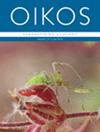Tree richness affects ground‐ant diversity and seed dispersal in a tropical biodiversity–ecosystem function experiment
IF 3
2区 环境科学与生态学
Q2 ECOLOGY
引用次数: 0
Abstract
The global loss of plant diversity is expected to have reverberating effects on other trophic levels, affecting the structure and functioning of ecosystems. To understand such effects, biodiversity–ecosystem function (BEF) experiments that manipulate tree diversity have been established around the world. In a BEF experiment carried out since 2016 in a seasonally dry tropical forest, we examined the effects of tree diversity, facilitation and density of trees with extrafloral nectaries on the abundance, richness, functional diversity and phylogenetic diversity of ground ants. Also, we used artificial seeds to test seed dispersal efficiency of ants within the experiment. Generalized linear mixed models (GLMM) showed that tree richness positively affects ant abundance, richness, functional diversity and phylogenetic diversity. Also, tree richness had a strong positive effect on the proportion of dispersed seeds, as well as their dispersal distance. Contrary to our expectations, facilitation and the number of trees with extrafloral nectaries did not affect ground ants and their functions. Our results indicate that the global impoverishment of tree communities can affect several dimensions of ant diversity and their ecosystem functions, including forest regeneration processes.在热带生物多样性-生态系统功能实验中,树木丰富度影响地表蚂蚁多样性和种子传播
全球植物多样性的丧失预计会对其他营养级产生反响,影响生态系统的结构和功能。为了了解这种影响,世界各地都建立了操纵树木多样性的生物多样性-生态系统功能(BEF)实验。自2016年起,我们在一个季节性干旱的热带森林中开展了一项BEF实验,考察了树木多样性、具有花外蜜腺的树木的促进作用和密度对地蚁的丰度、丰富度、功能多样性和系统发育多样性的影响。此外,我们还在实验中使用人工种子来测试蚂蚁的种子传播效率。广义线性混合模型(GLMM)显示,树木丰富度对蚂蚁的数量、丰富度、功能多样性和系统发育多样性有正向影响。此外,树木的丰富度对种子的散播比例及其散播距离也有很大的正向影响。与我们的预期相反,促进作用和具有花外蜜腺的树木数量并不影响地蚁及其功能。我们的研究结果表明,全球树木群落的贫瘠化会影响蚂蚁多样性的多个方面及其生态系统功能,包括森林再生过程。
本文章由计算机程序翻译,如有差异,请以英文原文为准。
求助全文
约1分钟内获得全文
求助全文
来源期刊

Oikos
环境科学-生态学
CiteScore
6.20
自引率
5.90%
发文量
152
审稿时长
6-12 weeks
期刊介绍:
Oikos publishes original and innovative research on all aspects of ecology, defined as organism-environment interactions at various spatiotemporal scales, so including macroecology and evolutionary ecology. Emphasis is on theoretical and empirical work aimed at generalization and synthesis across taxa, systems and ecological disciplines. Papers can contribute to new developments in ecology by reporting novel theory or critical empirical results, and "synthesis" can include developing new theory, tests of general hypotheses, or bringing together established or emerging areas of ecology. Confirming or extending the established literature, by for example showing results that are novel for a new taxon, or purely applied research, is given low priority.
 求助内容:
求助内容: 应助结果提醒方式:
应助结果提醒方式:


